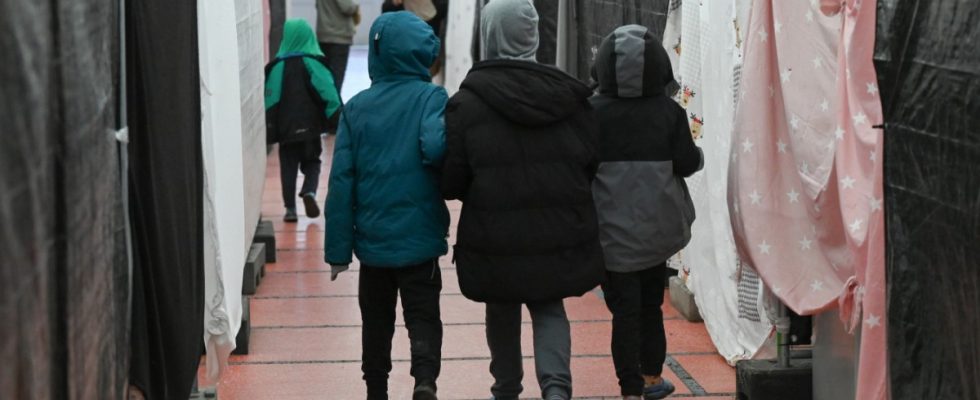The results of the federal and state refugee summit met with criticism even from those who sat at the negotiating table. Green MP Karoline Otte writes on Twitter that Chancellor Scholz and the Prime Ministers’ Conference want to “order the Bundestag to abolish the fundamental right to asylum.” Otte said to the SZ: “The result from the MPK exceeds all red lines that I can imagine as a Green member of parliament. The MPK resolution aims to massively curtail the rights of refugees. The basic right to asylum would be history.”
Karo Otte
(Photo: Svenja Appuhn)
Your party leader Omid Nouripour tries in the ARD morning show to dispel concerns in your own ranks as quickly as possible. “We will not allow the fundamental right to asylum to be undermined.” The Prime Ministers’ Conference is an advisory and not a decision-making body. The parliamentary procedure has not yet started.
The municipalities and the opposition in the Bundestag have also criticized the results of the prime ministers’ conference. “An agreement in November is clearly too late for 2024 and is met with great disappointment by the municipalities,” said the general manager of the German Association of Towns and Municipalities, Gerd Landsberg Rheinische Post. He commented that a permanent solution to finance refugee housing had been postponed until the autumn.
“It’s a bad signal for the cities,” said City Council President Markus Lewe of the newspaper. “The districts cannot really be satisfied with a postponement of urgent problems,” said the President of the German District Association, Reinhard Sager, to the newspapers of the Funke media group. Municipal representatives were not invited to the meeting.
When the agreement was reached on Wednesday evening, the federal government pledged one billion euros as an additional contribution to the costs of refugee care for this year. However, the future breakdown of the costs will first be discussed in a working group and a decision will not be made until November.
The billion is “just a drop in the ocean,” criticized Landsberg. The amount is intended to support the federal states in further relieving their municipalities and in financing the digitization of the immigration authorities. The federal government had previously pledged 1.5 billion euros for war refugees from Ukraine this year and 1.25 billion euros for other refugees. Saxony, Bavaria and Saxony-Anhalt recorded reservations about the summit results in a protocol statement.
Faeser praises results, opposition speaks of “disappointment summit”
Federal Minister of the Interior Nancy Faeser welcomed the results of the summit “I am very pleased with the agreement, which shows that all levels of government are living up to their great humanitarian responsibility together,” said the SPD politician on Thursday morning. “This package of measures reflects exactly the basic principles of our refugee policy: We protect people who have fled war and terror. To ensure that we are still able to do this, we limit irregular migration,” says Faeser.
Bavaria’s Prime Minister Söder, on the other hand, who was also at the negotiating table himself, did not go far enough. In the ARD, Söder said on Wednesday evening that “a clear concept against illegal immigration and for the repatriation of criminals is missing. No great progress has been made in either area today.”
The parliamentary group leader of the Left in the Bundestag, Dietmar Bartsch, also mentioned the round in the Chancellery in conversation with the Editorial network Germany (RND) a “disappointment summit”. The chairmen of the AfD parliamentary group, Alice Weidel and Tino Chrupalla, described the results as “not suitable for initiating the urgently needed migration turnaround in Germany. Even more money for even more refugees will not solve the refugee crisis, but will prolong it.”
The increase in participation is considered a concession to the federal states. However, they see the federal government as having a fundamental obligation. “The federal government alone holds the key to controlling and limiting migration. As long as it does not use this key sufficiently, it must contribute to the costs of the states and municipalities,” said Hesse’s Prime Minister Boris Rhein (CDU), who in November will be chairman of the Prime Ministers’ Conference (MPK).
The resolution paper from the summit also says: “From the point of view of the federal states, a breathing system is required in which the financial support from the federal government is based on the number of refugees arriving.” Declarations of intent by the federal government to curb so-called irregular migration more were largely welcomed, even if negotiations on this are still pending at EU level. In order to enforce deportations more consistently, the federal and state governments have also agreed to extend the maximum duration of detention from the current 10 to 28 days, said Chancellor Olaf Scholz (SPD).
People who are to be deported to their home countries but who have often behaved uncooperatively – for example by giving incorrect information about their nationality – can be taken into custody before leaving the country. According to the information, extended responsibilities of the federal police and an improved exchange of information between the judicial and immigration authorities were also agreed.

